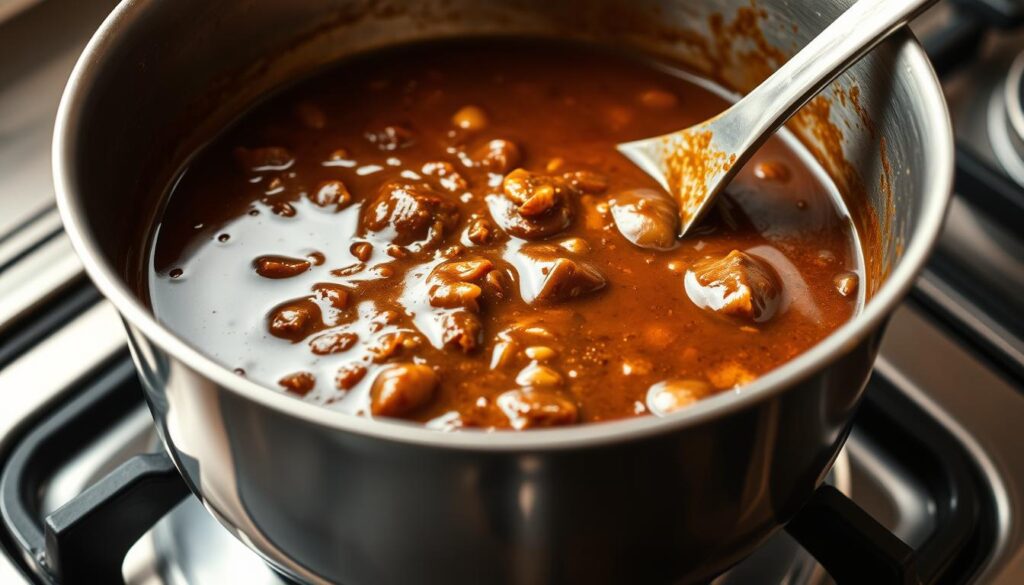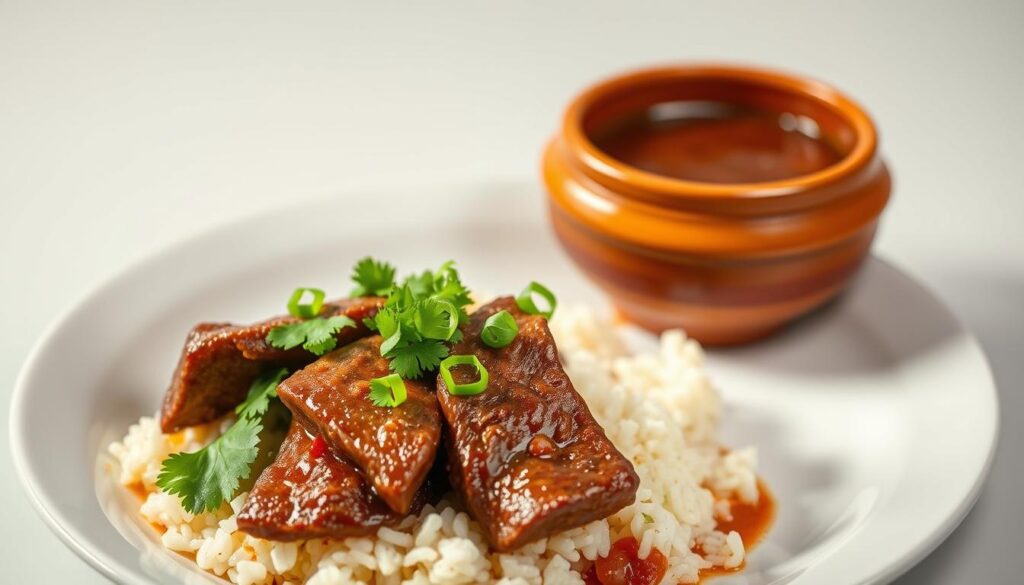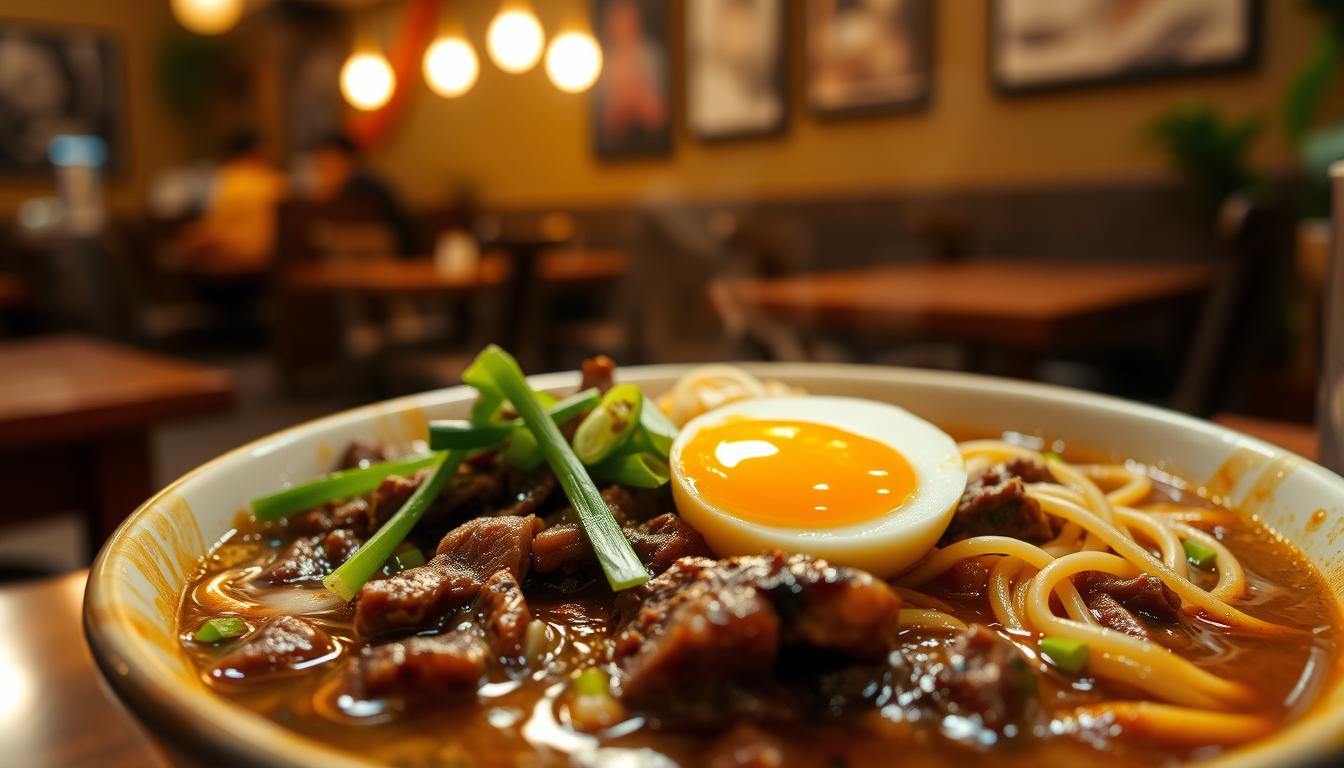Imagine a rainy afternoon in Manila. The raindrops create a cozy atmosphere. This is the perfect time for beef pares mami, a Filipino comfort food that warms your heart and soul.
This Filipino beef noodle soup is a favorite for many. It’s more than just a meal; it’s a cultural experience. It combines tender beef, a flavorful broth, and fresh egg noodles in one bowl.
Beef pares mami comes from the lively streets of Quezon City. It’s not just a meal; it’s a symbol of Filipino tradition. It brings people together through shared flavors and memories.
Table of Contents
The Origins and History of Filipino Beef Pares
Beef pares became a favorite in Manila’s street food scene. It won the hearts of many food lovers in the Philippines. This dish is a mix of cultural flavors that turned street food into a national favorite.
In 1979, Lolly and Roger Tiu started calling it “pares,” meaning “pairs” in English. This name fits perfectly with the mix of beef asado, garlic fried rice, and light beef broth soup.
Chinese Culinary Roots
Beef pares has deep Chinese roots, seen in its cooking and ingredients. It brings unique flavors from Chinese immigrants, like:
- Star anise for aromatic depth
- Soy sauce for umami richness
- Slow-cooking techniques that tenderize beef
Evolution of Street Food Culture
Beef pares started as a cheap, filling meal in carinderias. These small eateries made it a national favorite.
“Pares represents more than just a meal – it’s a culinary journey through Filipino food culture.” – Local Food Historian
Cultural Significance
In 2022, TasteAtlas ranked Filipino cuisine 23rd globally. Beef pares shows the Philippines’ rich food heritage. It’s a blend of influences that creates something uniquely tasty.
Essential Ingredients for Authentic Beef Pares Mami
To make a real beef pares Filipino dish, you need the right ingredients. They must work together to create a deep, rich flavor. Start by picking the best parts to make this comfort food special.
The base of beef pares mami is top-quality beef brisket, about 2 pounds. This cut makes the meat tender and full of flavor. You’ll also need aromatics and seasonings to turn simple ingredients into a dish you’ll remember.
- Meat Base:
- 2 lbs beef brisket
- 5 cups water for boiling
- Aromatic Ingredients:
- 4 cloves garlic, minced
- 1 medium onion, chopped
- 2-inch piece of ginger, sliced
- Flavor Enhancers:
- 3 tablespoons soy sauce
- 3 tablespoons oyster sauce
- 2 tablespoons hoisin sauce
- 2 tablespoons brown sugar
- 1 tablespoon fish sauce
- Spices:
- 2-3 star anise
- 1 teaspoon five-spice powder
- ½ teaspoon black pepper
Fresh miki noodles are key for a true beef pares experience. If you can’t find miki noodles, egg noodles or fresh wheat noodles work too. The important thing is to pick a noodle that soaks up the broth well but stays firm.
Pro tip: For the best flavor, use day-old rice for garlic fried rice. Make sure your beef is tender enough to be easily pierced with a fork.
Understanding Different Beef Cuts for Pares
Choosing the right beef cut is key for a tasty beef pares recipe. The meat you pick can change how tender and flavorful this Filipino dish is.
For a beef pares recipe, pick cuts that get tender with slow cooking. The best cuts turn tough into tender, delicious meat with the right braising.
Best Cuts for Tenderness
- Brisket: The gold standard for beef pares, known for rich flavor
- Short ribs: Provides exceptional marbling and deep meat flavor
- Beef shanks: Offers rich, gelatinous texture when slow-cooked
Budget-Friendly Options
Not all beef cuts are expensive. Some affordable options can still make a great beef pares recipe:
- Chuck roast: Economical and flavorful
- Round cuts: Lean and wallet-friendly
Preparation Techniques for Different Cuts
Proper preparation is crucial, no matter the cut. Trim excess fat, season generously, and allow enough braising time for tender meat. Low and slow cooking breaks down tough tissues, making your beef pares soft and tender.
Pro tip: Look for cuts with some marbling to ensure maximum flavor and tenderness in your dish.
The Secret to Perfect Beef Broth
Making the perfect beef broth is key to beef pares. It starts with preparing the meat well and using the right cooking methods. These steps turn simple ingredients into a rich, flavorful broth.
Blanching is the first step to a clear, clean broth. When making beef pares, follow these important steps:
- Select high-quality beef shank (500 grams recommended)
- Include beef marrow bone (160 grams) for enhanced depth
- Rinse meat thoroughly before blanching
- Briefly boil meat to remove impurities
The simmering process needs patience and focus. Gentle heat is key to extracting maximum flavor without creating a cloudy broth. Cook your beef for 1 to 1½ hours until it’s tender.
“A perfect broth tells a story of patience and technique” – Filipino Culinary Tradition
Seasoning is crucial for your broth’s flavor. Use these professional tips:
- Add 1 beef bouillon cube
- Season with 2 tablespoons brown sugar
- Use 8 cups of water for optimal consistency
- Simmer at a consistent low temperature
Mastering these techniques will help you make an authentic beef pares broth. It captures the heart of Filipino comfort food.
Mastering the Art of Braising Beef
Learning to make beef pares means mastering braising. This method turns tough cuts into tender, flavorful meat. It’s all about slow cooking that breaks down the meat and adds rich flavors.
- Beef brisket (500g)
- Beef tendons (500g)
- Chuck roast
- Short ribs
Traditional Braising Methods
Traditional braising starts with searing the meat. This step creates a rich, caramelized exterior. It locks in flavor and adds a beautiful golden-brown crust.
Temperature Control Tips
Keeping the heat low is crucial. You can cook at:
- Stovetop: Approximately 2.5 hours
- Pressure cooker: Around 35 minutes
- Slow cooker: 4 hours on high or 8 hours on low
Achieving the Perfect Tenderness
Slow cooking is the secret to beef pares. Simmering with 1 liter of water, 1/3 cup soy sauce, and 2 tablespoons oyster sauce makes the meat tender. Aromatics like star anise and laurel leaf add depth to the flavors.
Creating the Signature Pares Sauce

Making the perfect beef pares sauce is like creating a work of art. It turns a simple dish into a true masterpiece. The sauce is the heart of this beloved Filipino comfort food, blending complex flavors that dance on your palate.
To create an authentic beef pares sauce, you’ll need a carefully selected combination of ingredients:
- 3 tablespoons soy sauce
- 3 tablespoons oyster sauce
- 2 tablespoons hoisin sauce
- 2 tablespoons brown sugar
- 1 tablespoon fish sauce
- 2-3 pieces star anise
- ½ teaspoon black pepper
The secret to an exceptional beef pares sauce lies in balancing sweet and savory elements. Brown sugar adds a caramelized sweetness that cuts through the rich, umami flavors of soy and oyster sauces. Fish sauce brings depth and complexity to the sauce, while star anise introduces a subtle, warming spice.
When preparing the sauce, start by mixing the liquid ingredients in a saucepan. Gradually add brown sugar, stirring until it dissolves completely. For a thicker consistency, mix 2 tablespoons of cornstarch with 2 tablespoons of water and whisk into the sauce. Simmer until it reaches your desired thickness, allowing the flavors to meld together beautifully.
Pro tip: Taste and adjust the beef pares sauce as you cook. Every chef has their own unique touch!
How to Make Restaurant-Style Garlic Fried Rice
Making the perfect garlic fried rice is key to your beef pares recipe. This classic Filipino side dish adds rich, aromatic flavor and a crispy texture. Learning the right technique will make your home cooking taste like a restaurant.
Rice Selection and Preparation
The secret to great garlic fried rice is the rice you choose. For the best beef pares, use cold, day-old white rice. Fresh rice is too moist and can get mushy when stir-fried. If you have fresh rice, spread it on a baking sheet and chill it for a few hours to dry it out.
- Use 4 cups of cold, cooked white rice
- Prepare 4 servings of Sinangag (Garlic Fried Rice)
- Refrigerate fresh rice to reduce moisture
Garlic Cooking Techniques
Getting garlic right is essential for a true beef pares side dish. Start by peeling and mincing one whole head of garlic. Heat ¼ cup of canola oil over low heat to infuse it with garlic flavor before browning. This method gives a deep, rich taste without burning.
“The key to amazing garlic fried rice is patience and low, slow heat.” – Filipino Culinary Tradition
- Heat oil on low temperature
- Add minced garlic gradually
- Cook until golden and crispy
- Stir-fry rice on high heat for 45 seconds
Your garlic fried rice will perfectly match your beef pares. It will make a delicious and authentic Filipino meal that feels like dining at a restaurant.
Professional Plating and Serving Suggestions
Presenting your beef pares Filipino dish is more than just putting food on a plate. It’s about turning a simple meal into a feast for the eyes and taste buds.

Your beef pares presentation can make the dining experience better. It’s all about the details and how it looks. Professional chefs know that people judge food by how it looks first.
Traditional Presentation Methods
In traditional Filipino dining, beef pares is served in a special way:
- Serve the braised beef in a deep ceramic bowl
- Place garlic fried rice on a separate plate
- Provide a small bowl of rich beef broth on the side
- Garnish with finely chopped green onions
Modern Serving Variations
Today, beef pares is presented in new and creative ways:
- Use white rectangular plates for contrast
- Create height by stacking rice and meat
- Drizzle sauce in artistic patterns
- Experiment with minimalist garnishing techniques
The aim is to highlight the dish’s rich flavors and textures. Each plate tells a story of Filipino culinary tradition, updated for today’s diners.
Conclusion
Your journey into beef pares mami shows the beauty of Filipino comfort food. It’s more than a meal; it’s a cultural bond that ties generations. By learning its secrets, you can make your kitchen a true Filipino food haven.
Making beef pares mami at home lets you balance beef, sauce, and noodles perfectly. It might look hard, but with time, you’ll get better. Always remember, patience and care are crucial in making this Filipino classic.
Beef pares mami is great for any occasion, whether it’s for family, friends, or yourself. It’s perfect for any meal, from weeknights to big celebrations. This dish brings people together, celebrating the Philippines’ rich food culture.
Now, you’re not just cooking; you’re connecting with a beloved tradition. Enjoy every step of your beef pares mami adventure. The delicious outcome will be worth it.
FAQ
What is beef pares mami?
Beef pares mami is a favorite Filipino comfort food. It has tender braised beef in a flavorful broth with fresh egg noodles. This dish is a mix of Chinese flavors and local cooking, loved by many.
What are the key ingredients in beef pares mami?
Key ingredients include beef, miki noodles, soy sauce, and oyster sauce. You also need star anise, garlic, ginger, brown sugar, and aromatics. Fresh miki noodles are best, but you can use other noodles if needed.
How long does it take to prepare beef pares mami?
It takes 2-3 hours to prepare. Braising the beef is the longest part, needing 1.5-2 hours. Preparing the broth and sauce adds more time.
What is the best cut of beef for pares?
Brisket and short ribs are the top choices for their flavor and tenderness. Chuck and round cuts are cheaper but still delicious when braised well.
Is beef pares mami difficult to make at home?
It’s not hard for those with basic cooking skills. The trick is mastering braising and balancing the sauce’s flavors. A detailed recipe and patience will help you make a great dish.
Can I make beef pares mami in advance?
Yes, it’s perfect for making ahead. The flavors get better with time, so it’s great to prepare the beef and broth ahead. Store them in the fridge and reheat when you’re ready.
Are there any vegetarian alternatives to beef pares?
You can make vegetarian versions using tofu, seitan, or mushrooms. Just adjust the sauce and broth to keep the dish’s unique flavors.
What is typically served with beef pares mami?
Garlic fried rice (sinangag) is the top choice. Some also like it with pickled veggies or extra chili oil or soy sauce for more flavor.
How do I store leftover beef pares?
Keep the beef and broth in separate airtight containers in the fridge. They last 3-4 days. Reheat gently to avoid tough meat. Add fresh noodles when serving.
What makes the sauce in beef pares so special?
The sauce is a mix of soy, oyster, and hoisin sauces, sweetened with brown sugar. This blend creates a rich, sweet, and savory taste that’s loved by many.
Source Links
- 12 Best Filipino Comfort Foods to Enjoy During the Rainy Season | The Family Man – https://www.ryanthefamilyman.com/blog-posts/12-best-filipino-comfort-foods-to-enjoy-during-the-rainy-season
- Pares Retiro Menu Philippines Prices & Promos Updated 2024 – https://smpfoodies.com/pares-retiro-menu-philippines/
- Pares (food) – https://en.wikipedia.org/wiki/Pares_(food)
- Filipino cuisine – https://en.wikipedia.org/wiki/Filipino_cuisine
- 10 Best Pares in Manila [2025] | FunEmpire® – https://www.funempire.com/ph/blog/pares-manila/
- Beef Pares – https://www.kawalingpinoy.com/beef-pares/
- Beef Pares Recipe: A Filipino Comfort Food Classic – https://onestophalal.com/blogs/info/beef-pares-recipe-a-filipino-comfort-food-classic
- Here’s Where to Eat Beef Pares Mami Around Metro Manila – https://thebeat.asia/manila/delish/happenings/ready-your-tummies-heres-where-to-eat-beef-pares-mami-around-metro-manila
- Beef Wonton Mami – https://www.kawalingpinoy.com/beef-wonton-mami/
- Taiwanese Beef Noodle Soup with Bone Marrow Broth – Yum Around the World – https://yumaroundtheworld.com/taiwanese-beef-noodle-soup/
- Batchoy Recipe – https://panlasangpinoy.com/batchoy/
- Braised Beef Tendon Pares: A Slow-Cooked Delight ~ Relax Lang Mom – https://relaxlangmom.com/braised-beef-tendon-a-slow-cooked-delight/
- Pares Recipe: A Guide to the Famous Filipino Beef Dish” – meatrecipesblog – https://www.meatrecipesblog.com/pares-recipe/
- Sinangag – https://www.kawalingpinoy.com/sinangag/
- Mama’s Pressure Cooker Beef Pares ~ Relax Lang Mom – https://relaxlangmom.com/mamas-pressure-cooker-beef-pares/
- Pares Retiro Menu Prices in Philippines Updated 2025 – https://menupines.com/pares-retiro-menu/
- Causeway Menu Prices in Philippines 2025 Updated – https://menupines.com/causeway-menu-prices/









